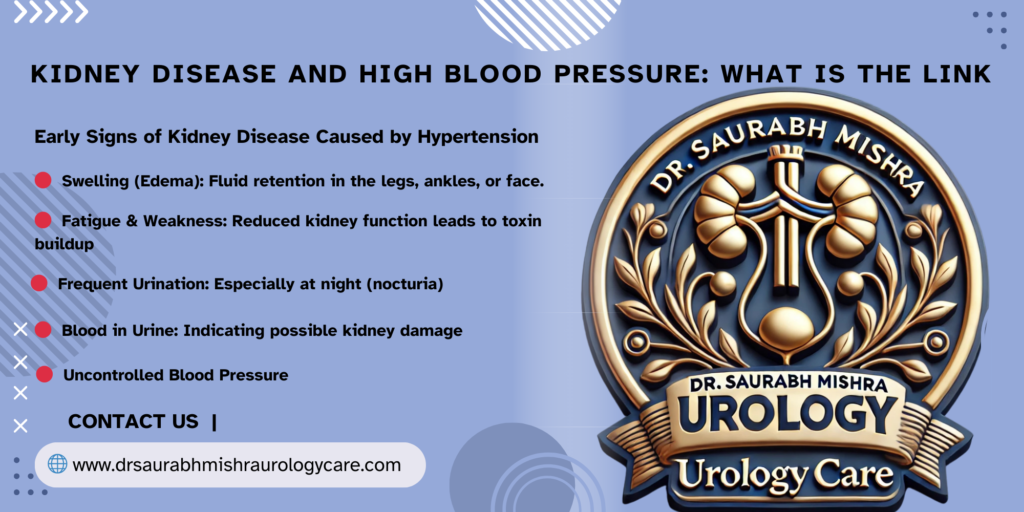kidney disease and High blood pressure (hypertension) and are closely linked. This creates a vicious cycle that can lead to serious health complications. Hypertension damages the small blood vessels in the kidneys, reducing their ability to filter waste and excess fluids effectively. In turn, poorly functioning kidneys contribute to increased blood pressure, worsening the condition.
Dr. Saurabh Mishra, a renowned urologist, emphasizes the importance of early diagnosis and management to prevent irreversible kidney damage. Let’s explore how hypertension affects kidney health and what you can do to protect yourself.
How High Blood Pressure Affects the Kidneys
The kidneys contain millions of tiny filtering units called nephrons. These units rely on a network of blood vessels to function properly. When blood pressure is consistently high, it can:
✔ Damage Blood Vessels – Persistent hypertension causes the arteries around the kidneys to narrow. It causes them to harden or weaken. This reduces blood flow.
✔ Impair Filtration – Damaged kidneys struggle to remove waste, excess fluids, and toxins, leading to further complications.
✔ Cause Fluid Retention – The body retains salt and water, increasing blood volume and further raising blood pressure.
Over time, these changes can lead to chronic kidney disease (CKD) or even kidney failure, requiring dialysis or transplantation.
Early Signs of Kidney Disease Caused by Hypertension
Kidney disease often progresses silently in the early stages. However, some warning signs include:
🔹 Swelling (Edema): Fluid retention in the legs, ankles, or face.
🔹 Fatigue & Weakness: Reduced kidney function leads to toxin buildup.
🟢 Frequent Urination: Especially at night (nocturia).
🔹 Blood in Urine: Indicating possible kidney damage.
🔹 Uncontrolled Blood Pressure: Hypertension that is hard to manage despite medications.
If you experience any of these symptoms, consult a specialist like Dr. Saurabh Mishra for early intervention.
Who Is at Risk for Kidney Disease ?
Certain factors increase the likelihood of developing kidney disease due to high blood pressure:
✅ Diabetes: High blood sugar damages kidneys.
✅ Family History: Genetics play a role in kidney health.
🟢 Obesity: Excess weight increases hypertension risk.
✅ Smoking & Alcohol: Damages blood vessels, worsening kidney function.
✅ Sedentary Lifestyle: Lack of exercise contributes to hypertension.
Individuals with these risk factors should prioritize regular kidney screenings and blood pressure monitoring.
Preventing Kidney Disease from High Blood Pressure
Dr. Saurabh Mishra recommends the following steps to protect your kidney health:
🩺 Monitor Blood Pressure: Maintain a reading below 120/80 mmHg if possible.
🥗 Adopt a Kidney-Friendly Diet: Reduce salt, processed foods, and excessive protein intake.
🚶 Exercise Regularly: Aim for at least 30 minutes of physical activity daily.
🚭 Quit Smoking & Limit Alcohol: These habits worsen kidney and heart health.
💧 Stay Hydrated: Drink plenty of water to aid kidney filtration.
💊 Take Medications as Prescribed: ACE inhibitors and ARBs help protect kidney function.
For a personalized treatment plan, seek professional guidance from Dr. Saurabh Mishra, an expert in kidney and urological health.
When to See a Doctor
If you have persistent high blood pressure, diabetes, or kidney disease symptoms, schedule a consultation with a specialist. Early detection through blood tests (creatinine, GFR) and urine analysis can prevent further complications.
Internal Resources
External Resources
Conclusion
High blood pressure and kidney disease are deeply interconnected, making proactive care essential. Lifestyle changes, regular monitoring, and expert medical guidance from professionals like Dr. Saurabh Mishra can help prevent serious complications.
🔗 Take control of your kidney health today! Book an appointment with Dr. Saurabh Mishra for expert advice.




